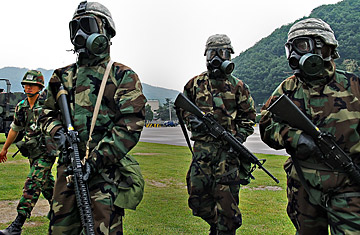
U.S. soldiers take part in a joint military drill with South Korean soldiers north of Seoul
To fear a new Korean War is historically inaccurate, because, in fact, the last one never ended: the world's most dangerous border, across which some 2 million North Korean, U.S. and South Korean troops face each other along the 38th parallel of the Korean Peninsula is, in fact, simply an armistice line. On July 27, 1953, the U.S. and North Korea signed a truce pausing, but not ending, a war that claimed more than 2 million lives, including those of 36,940 U.S. troops. And the North's recent nuclear and missile saber-rattling has many growing nervous about the potential for a resumption of hostilities.
North Korea, in fact, announced on May 27 that it was withdrawing from the armistice. It declared it could no longer guarantee the safety of ships sailing through the Yellow Sea off its western coast, and would no longer respect the legal status of several islands off South Korea's coast. It also vowed to attack South Korea if North Korean vessels suspected of smuggling nuclear and missile components are stopped and searched by a U.S.-led U.N. naval armada — a proposal currently under discussion.
U.S. officials are concerned that political instability inside the Pyongyang regime may raise the danger of confrontation. "Dear Leader" Kim Jong Il has been weakened by a stroke suffered late last year, his 26-year old heir apparent is not yet ready to take the reins and the North Korean military is eager to maintain its preeminence in the coming political succession. "Any time you have a combination of this behavior of doing provocative things in order to excite a response — plus succession questions — you have a potentially dangerous mixture," said U.S. Director of National Intelligence Dennis Blair on Monday.
Despite the rising tensions, however, a number of factors militate against a new chapter being opened in the Korean War. South Korea, backed by the U.S., doesn't want war, because the North has some 13,000 artillery tubes aimed at Seoul and the more than 10 million South Koreans living within 30 miles of the DMZ. North Korea, backed by China, doesn't want war because if it comes, it all but guarantees the collapse of Kim's regime, which is also the family business.
Washington has made clear that it wants to solve this latest flare-up via diplomatic channels. "Our focus is now — and has been and likely will continue to be — on coming up with diplomatic and economic pressures that will persuade the North to abandon its pursuit of nuclear weapons and the platforms to deliver them," Pentagon spokesman Geoff Morrell said June 8. And if that fails? "We all need to be prudent about our planning for defensive measures." That suggests neither Washington nor Seoul is going to take preemptive military action.
The immediate priority of the U.S. and its allies is to prevent North Korea from spreading its nuclear know-how around the world. And their own lever is China's influence over the hermit regime. "There's a view that if you want to get the Chinese to act on North Korea, you need to signal a willingness to take military action," Scott Snyder, a Korea expert with the Council on Foreign Relations, said last week. "But at the same time, how do you do that — especially in conjunction with allies — without the Chinese feeling that you're trying to manipulate them tactically?"
China's role will be key, according to Larry Wortzel, who served two tours as a U.S. Army military attaché in Beijing. "China will not let North Korea collapse," he was told by several top People's Liberation Army officials during the Clinton Administration, according to his account in the latest issue of the U.S. Army journal Parameters. Beijing will help Pyongyang survive any sanctions. "There are limits to what the United States and its allies can do," he warns, "unless they want a complete break with, or to invite conflict with, China." China's motives are twofold: keep North Korean refugees from flooding across the border, as well as keep a U.S. ally from emerging on China's doorstep.
If it came to war, however, a key goal of any large North Korean attack would be to launch as many shells and rockets toward Seoul from its artillery tubes and launchers, many self-propelled or on railcars. The goal of U.S. and South Korean forces would be to destroy that artillery capability before too many rounds could be launched. While North Korea would build any attack around its 1.2 million–strong army, the U.S. and South Korea would rely more on their air and naval forces.
The Pentagon has largely refrained from saber-rattling, and is not planning to reinforce the 28,000 U.S. troops now in South Korea, or the 35,000 stationed in Japan. When pressed, U.S. military leaders concede that even their defensive plans will be tougher to implement given the fact that they currently have roughly 175,000 troops deployed in Afghanistan and Iraq. "There would have to be a level of ad hoc conglomeration of forces," General James Conway, the Marine commandant, told a Senate panel June 2. "But in the end, I am convinced we would prevail."
